Key takeaways:
- Academic citations are essential for scholarly communication, ensuring credit is given and enabling readers to trace sources.
- Proper citations uphold academic integrity, prevent plagiarism, and enhance the credibility of the researcher.
- Utilizing citation management tools like Zotero and Mendeley streamlines the citation process and reduces formatting errors.
- Regularly reviewing and revising citations can prevent inaccuracies, improve understanding, and enhance the overall quality of academic work.
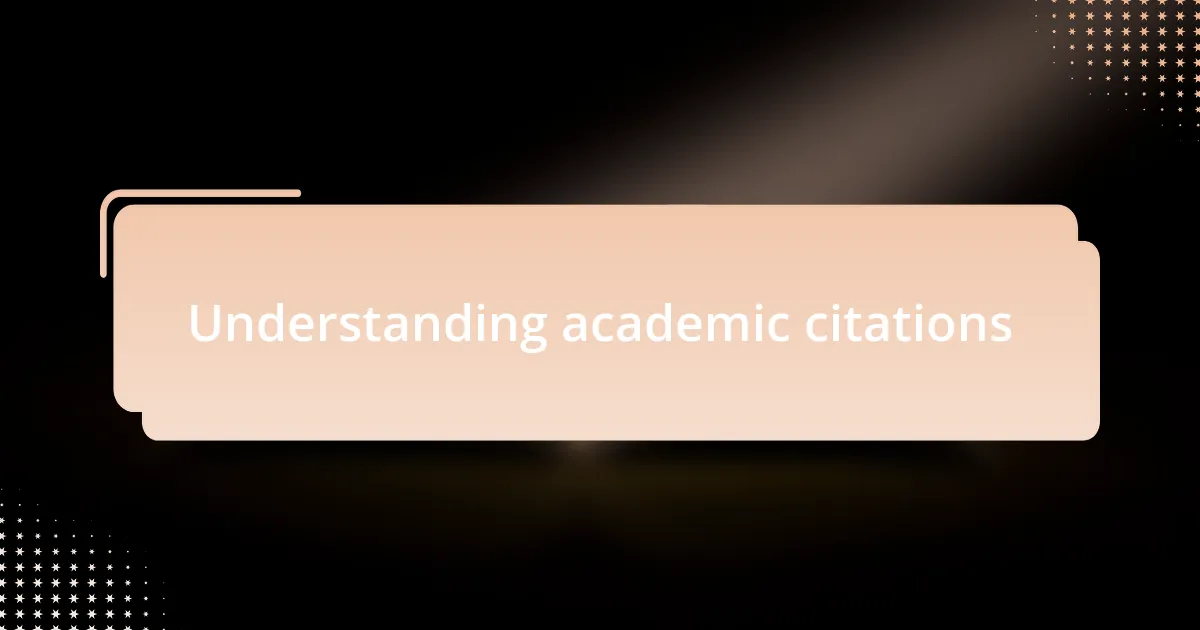
Understanding academic citations
Academic citations are the backbone of scholarly communication, giving credit to original ideas while allowing readers to trace back the sources. I remember the first time I faced the challenge of citations during my academic journey; I felt overwhelmed by the different styles and formats. It made me question, how can we truly express our thoughts when we’re constantly juggling the nuances of citation rules?
Understanding the purpose behind citations is crucial. They’re not just bureaucratic necessities; they’re a way to engage with the academic community and validate our work. When I first learned about this, it felt liberating. Suddenly, citations transformed from chores into opportunities to connect with the thoughts of others and enhance my arguments.
Moreover, knowing the various citation styles—like APA, MLA, or Chicago—can feel daunting, but each serves its own purpose and audience. Have you ever considered how different fields prioritize types of information? This realization helped me appreciate that citations shape the conversation in each academic discipline, ultimately enriching my understanding and appreciation of diverse perspectives.
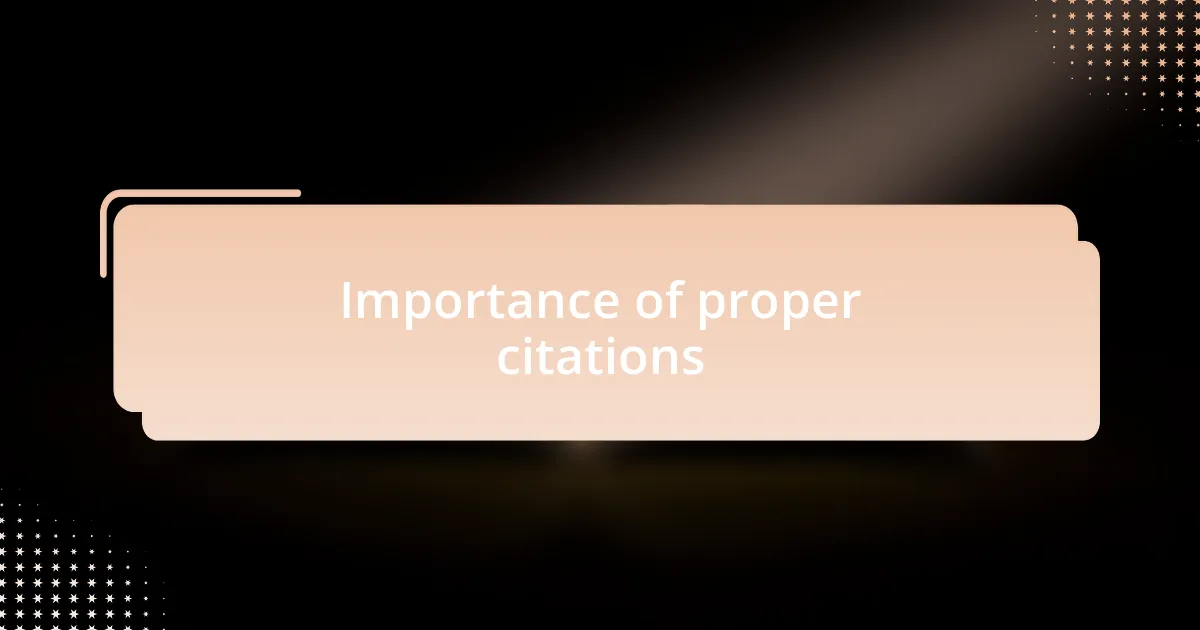
Importance of proper citations
Proper citations are essential because they uphold academic integrity and help prevent plagiarism. I remember feeling anxious in my early writing days—wondering if I had cited everything correctly. It’s a common fear among students and professionals alike; the last thing you want is to face the repercussions of not giving proper credit.
Additionally, citations allow readers to pursue further research based on your work. When I first began to see them as gateways to additional knowledge, my writing transformed. I found joy in leading readers to the sources that shaped my arguments. Have you ever followed a citation trail and discovered something that changed your perspective? It’s thrilling to think about the connections that proper citations create within the academic community.
Finally, accurate citations enhance your credibility as a researcher. They showcase your diligence and respect for the original authors’ work. I recall feeling a sense of pride when my professors praised my meticulous use of citations, confirming that I was contributing to the ongoing scholarly dialogue. After all, isn’t the goal of academic publishing to inspire further dialogue and understanding? Proper citations are a crucial part of achieving that goal.
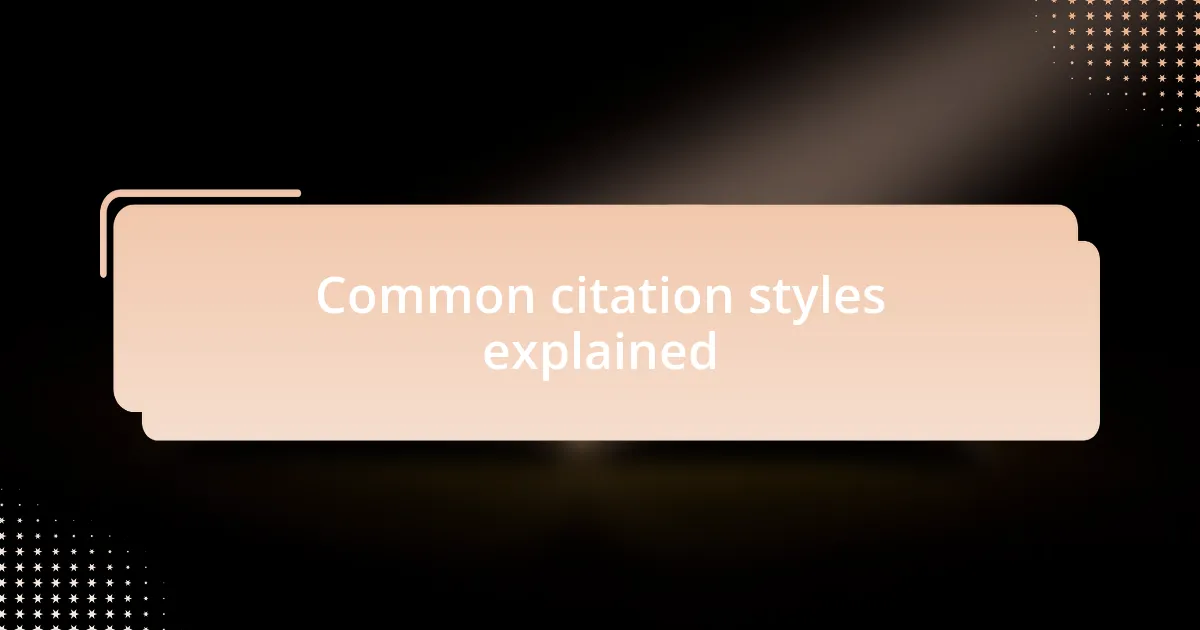
Common citation styles explained
Common citation styles serve as standardized methods for crediting sources in academic writing. For instance, APA style is widely used in the social sciences and emphasizes the author’s last name and publication date, allowing readers to quickly gauge the relevance of the source. I remember switching to APA when I first tackled a psychology paper; the clarity it provided made my references feel organized and professional.
Another popular citation style is MLA, often favored in the humanities. It focuses on the author’s name and page number in in-text citations, which I found to be quite intuitive when I was writing my literary analysis essays. Have you ever spent hours scrambling to format citations correctly? I can relate—MLA’s simplicity helped alleviate some of that stress for me, making it easier to focus on developing my arguments instead.
Then there’s Chicago style, known for its flexibility and use of footnotes to cite sources. I used Chicago when writing a history thesis; the footnotes allowed for detailed commentary without cluttering the text. I often wonder how I would have navigated that extensive research without the clarity Chicago style provided. Isn’t it interesting how the choice of citation style can influence both our writing process and the reader’s experience?
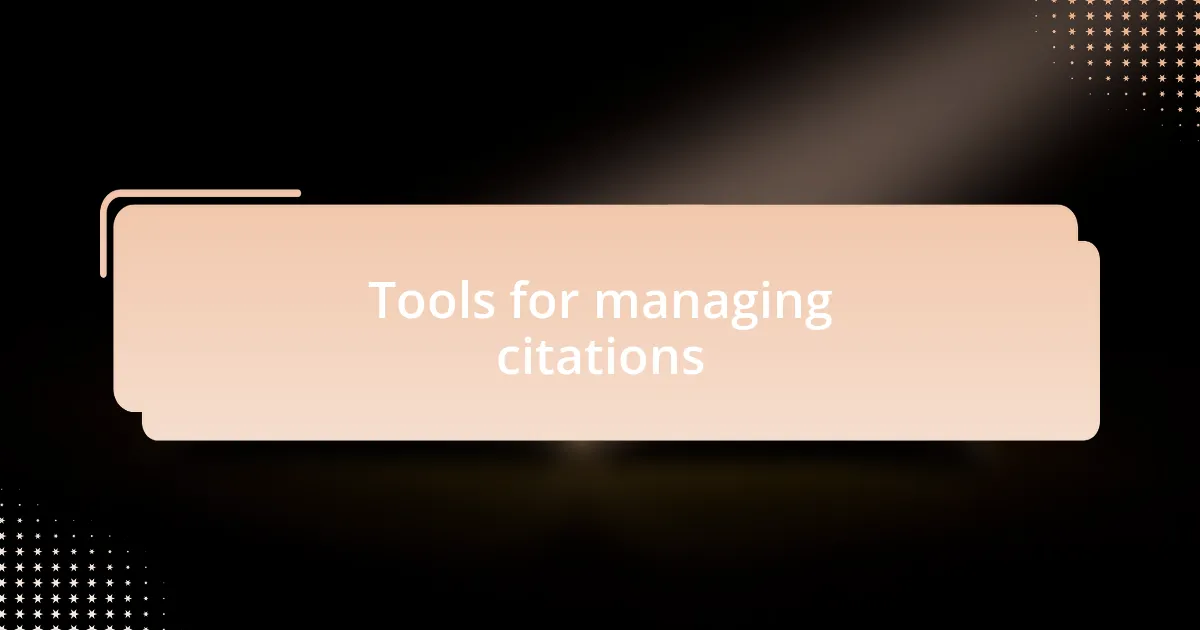
Tools for managing citations
When it comes to managing citations, I’ve found that tools like Zotero and Mendeley can be game changers in the academic writing process. These platforms allow you to organize your references effortlessly, saving countless hours of tedious formatting. I remember the relief I felt when I discovered Zotero; it not only keeps track of my sources but also enables me to generate citations instantly, which has been a true lifesaver during crunch time.
Another fantastic option is EndNote, which I used while working on my thesis. The ability to collaborate with peers and simultaneously manage shared libraries is invaluable in a research environment where teamwork is essential. Have you ever had to send out a document for review only to discover a citation was missing? Trust me, having everything organized in EndNote could have saved me from that last-minute panic.
For those who prefer a more straightforward approach, using citation generators like Citation Machine or BibMe can simplify the process. These tools are especially useful for beginners who may not yet be familiar with various citation styles. I distinctly recall my frustration early in my studies, trying to format citations manually; these generators were like a breath of fresh air. How much more productive could we be with the right tools at our disposal?
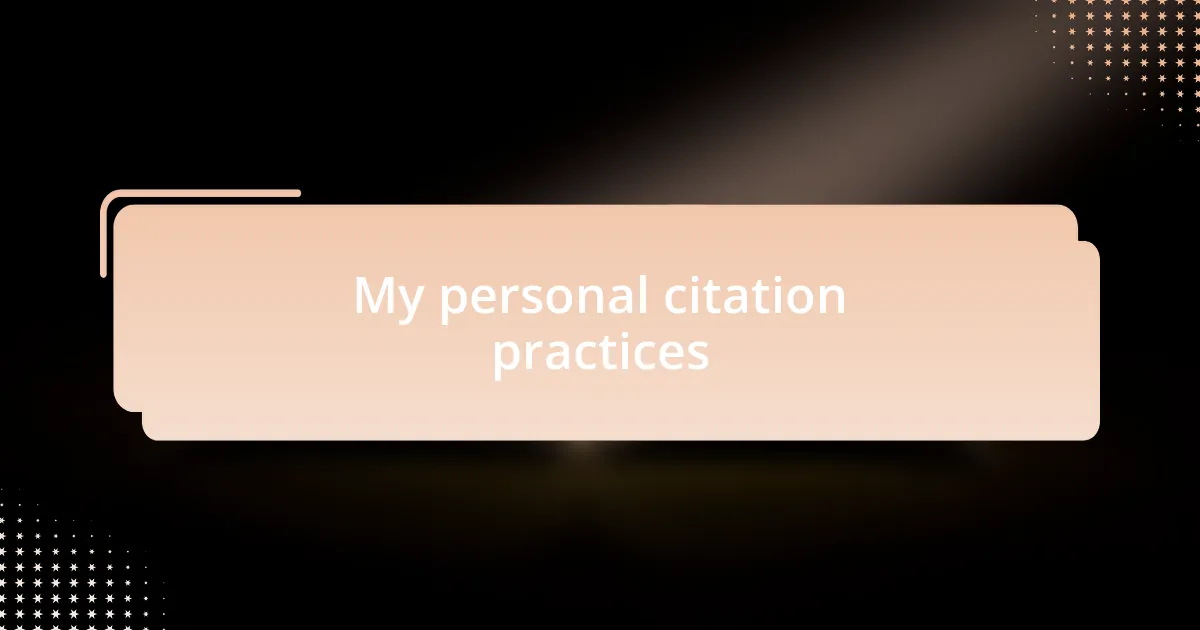
My personal citation practices
When it comes to my personal citation practices, I’ve developed a systematic approach that makes the process feel less daunting. I always start by maintaining a running list of sources as I conduct research. I remember a time when I neglected this step, only to scramble at the last minute to piece everything together. Now, I make it a habit to input each citation immediately, which saves me stress later on.
In addition to using citation management tools, I often double-check my references against the most recent guidelines provided by style manuals. This attention to detail stems from a painful experience during a conference submission where I incorrectly formatted a reference. It served as a reminder that even minor errors can undermine credibility in academic work. I often ask myself, how can I expect others to trust my research if I can’t get the basics right?
I also like to customize citation styles based on the specific needs of each project. For instance, in a recent project, I opted for a less common format to align with the journal’s preference. This flexibility allowed my work to stand out positively, but it required additional effort to ensure accuracy. Reflecting on this, I believe that adaptability in citation practices can truly enhance the presentation of my academic work.
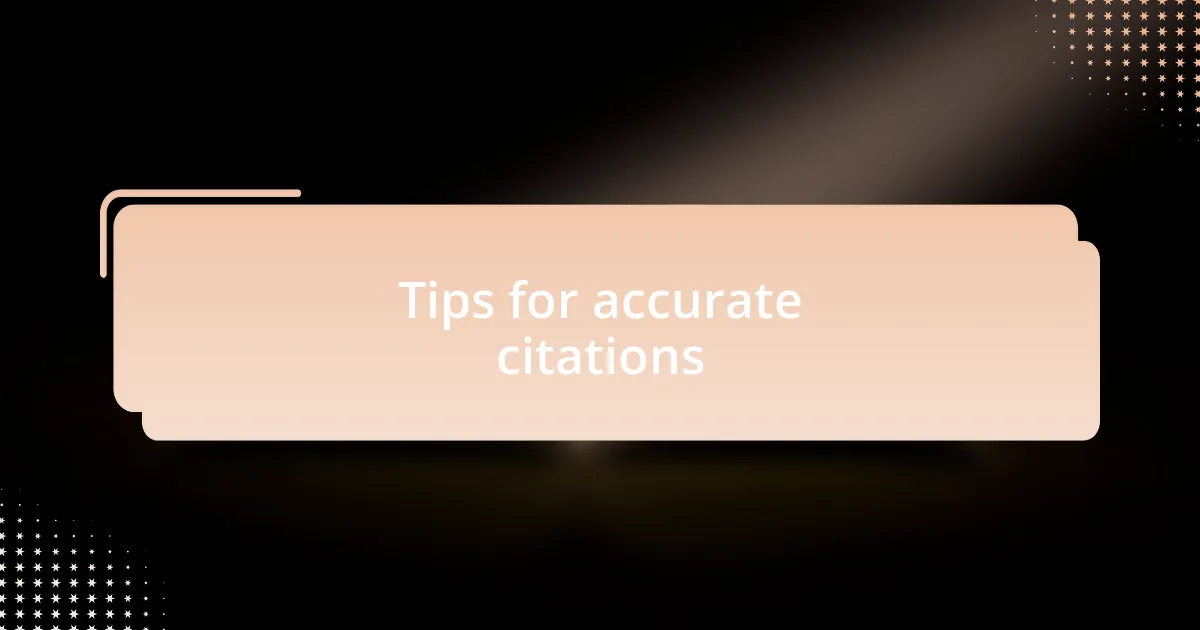
Tips for accurate citations
One important tip I’ve learned is to always verify the accuracy of each citation with the original source. I recall one unfortunate instance where I referenced a study incorrectly, thinking I had it right because I relied on a secondary source. That experience taught me that relying solely on someone else’s summary can lead to misunderstandings and misrepresentation. Trust me, the extra time spent confirming details is invaluable.
Another strategy I find beneficial is to use citation management software. These tools can simplify the process and help organize all my references efficiently. I remember the exhilaration I felt after my first successful submission, where I used one of these tools to manage over fifty citations seamlessly. It was a game-changer; not only did I save precious time, but I also reduced the risk of error significantly.
It’s also helpful to periodically review and refresh your understanding of citation styles. I once attended a workshop that focused solely on citation rules and nuances, which reignited my passion for precise referencing. This commitment to continuous learning keeps me engaged and ensures I’m always presenting my research with the utmost accuracy. Why settle for anything less when the integrity of your work is on the line?
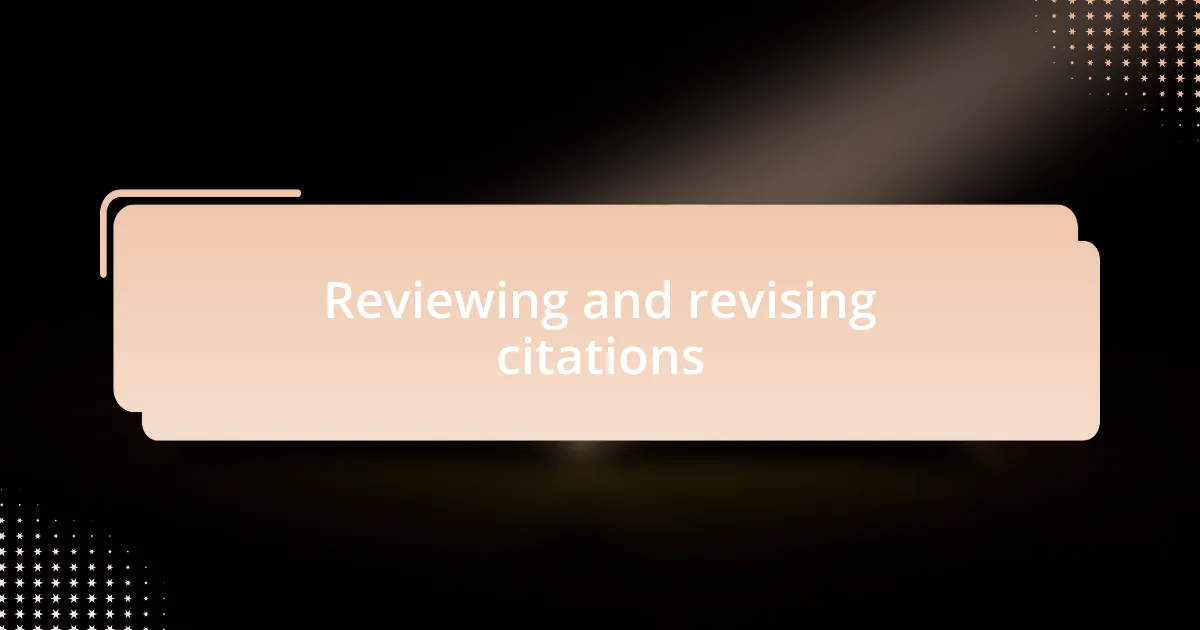
Reviewing and revising citations
After completing your initial draft, reviewing your citations is crucial. I remember going through my own work, only to discover several minor discrepancies that could have led to significant issues down the line. It’s like double-checking a recipe before serving a meal; even small errors can alter the final outcome. What’s worse than having your carefully crafted arguments undermined by citation flaws?
When I revise my citations, I take a moment to read each source carefully once more. This process often reveals insights I might have missed initially, sparking new ideas or strengthening my arguments. I find that this reflective practice not only sharpens my understanding but also enhances the overall quality of my work. Wouldn’t you agree that every detail matters when aiming for academic excellence?
Finally, involving a peer in the citation review process can be incredibly helpful. I once had a fellow researcher spot a crucial inconsistency in my citations that I had overlooked. Collaboration in this way can bring fresh eyes and perspectives, ensuring that your citations not only match your references but also uphold the integrity of your research. Have you ever had someone uncover a pivotal detail that changed your entire viewpoint? It’s moments like these that remind us the value of teamwork in academia.